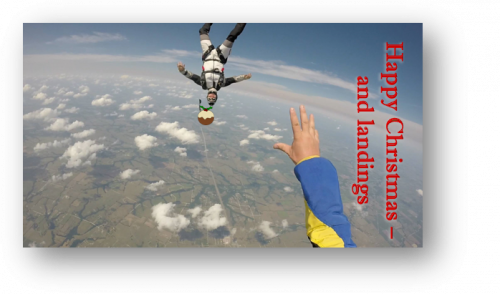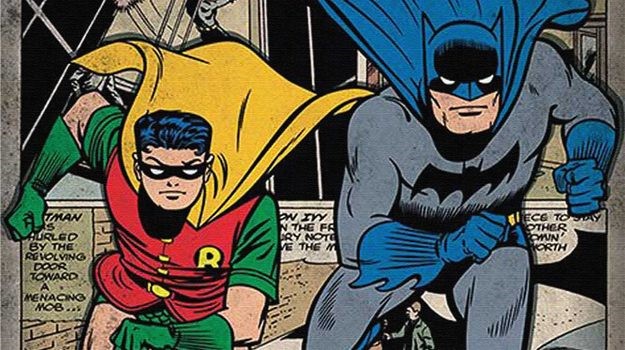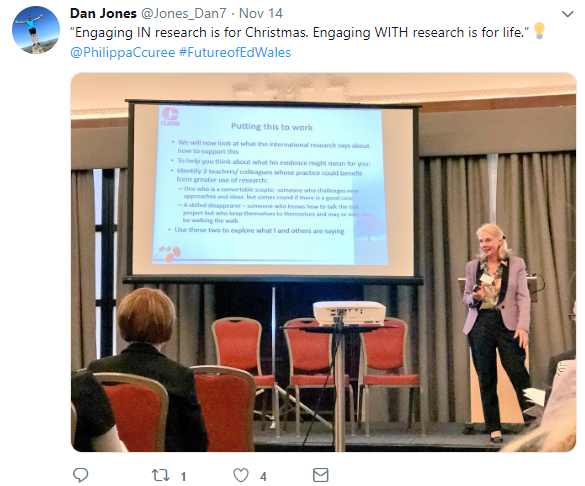Prefer to read it on the train/ in the bath/ during christmas dinner? Print-friendly PDF version here.
Contents
The Christmas Blog - Paul Crisp
The Ig Noble Awards - Matias Landini
If Only They Had Coached... - Matias Landini
CUREE Word Search
Harnessing Research in Practice
___________________________________________________________________________________________________________________
The Christmas Blog
 This is the edition of E-news where I get to write the Blog rather than Philippa. This is partly a ‘tradition’ (now in its second year) and partly because the Boss was in Jordan (known, in my youth, as the seasonally apposite ‘Holy Land’) when the draft was due. She tells me, by the way, that they are very keen on Christmas in that (Muslim) country at least in the form of displaying Christmas trees – though they are known locally as Infidel trees! So, while she’s not looking, I get a chance to sneak in some amusing (others would call it sarcastic) comment about our education world.
This is the edition of E-news where I get to write the Blog rather than Philippa. This is partly a ‘tradition’ (now in its second year) and partly because the Boss was in Jordan (known, in my youth, as the seasonally apposite ‘Holy Land’) when the draft was due. She tells me, by the way, that they are very keen on Christmas in that (Muslim) country at least in the form of displaying Christmas trees – though they are known locally as Infidel trees! So, while she’s not looking, I get a chance to sneak in some amusing (others would call it sarcastic) comment about our education world.
Last Xmas, I was making optimistic noises about the growing saliency of evidence-informed practice pointing particularly to the DfE-funded Strategic School Improvement and Teaching and Learning Innovation Funds. Well, it was good while it lasted but, unfortunately, it didn’t last much past New Year when Justine Greening was replaced by Damian Hinds. Shortly after, it became questionable whether, whatever his enthusiasms were, they included evidence-based school improvement. Or any kind of school improvement. Or, possibly, schools. Or education. On the evidence thing, The DfE has form in bare-faced cheek, demanding fidelity to the evidence from others while interpreting statistics in ways which give new life to the saying which Mark Twain famously attributed to Disraeli
Into the policy vacuum, jump several other players, although none of them from Her Majesty’s Loyal Opposition. The Chief Inspector seized the opportunity to sidle into the curriculum space while the Education Endowment Foundation occupied all the others. A pointed example was their advice to heads and system leaders more broadly on how to run a successful project which was clearly assembled from the research but without a real world sense of what on earth this might mean in practice.
Here at CUREE Mansions, we are more pragmatic. We know, for instance, how much effort is required to get hard pressed leaders and practitioners to set aside some time from the actual job of improving teaching and learning, to capture the data which shows what’s working and what isn’t. We have learned to live with the shocking truth that people don’t always do what you ask of them even when you are paying them to do it. Education professionals are strongly motivated to improving the lives of their students and much less motivated to jump through hoops to account to others on how they are doing it. But we need to know that our efforts are actually helping things to improve, so the trick is in getting those practitioners to identify with the honourable task of helping their successors avoid the same mistakes; taking the risk of creating new approaches rooted in evidence about what works and taking serious account of what doesn’t.
Speaking of mistakes, and segueing into the general theme of this edition of E-news, various denizens of the edu-twittersphere spotted this randomised control trial published by the BMJ (British Medical Journal). Entitled “Parachute use to prevent death and major trauma when jumping from aircraft: randomized controlled trial”, this study examined whether using a parachute prevents death or major traumatic injury when jumping from an aircraft. They ‘enrolled’ 23 subjects and randomly assigned them to the ‘treatment’ group (got a parachute) and the control group (got an empty rucksack). In this well designed study, subjects jumped out of an aircraft and the researchers measured the extent and distribution of death or serious injury. They subjected their results to a number of well defined statistical tests and then reported their conclusions – which were that parachute use did not significantly reduce death or major injury (0% for parachute v 0% for control; P>0.9).
You can read the article here or flip down to the bottom of the page for a one sentence explanation* of these implausible results.
Have a very Happy Cheristmas and an Optimistic New Year
Paul Crisp
Managing Director
The Ig Noble Awards
In the researching world, Christmas heralds a time for special research, and no, it’s not the eternal scepticism held towards a virgin birth around 2050 years ago! It’s the Ig Nobel awards! The annual parody of the Nobel Prize awards, given out to the most unusual or trivial achievements in scientific research!
Some of the prizes of note are:
- Medicine Prize: Mitchell and Wartinger for their paper for the use of roller coasters to try and hasten the passage of kidney stones.
- Literature Prize: Blackler, Gomez, Popovic and Thompson, for documenting that most people who use complicated products don’t read instruction manuals.
- Peace Prize: Alonso, Esteban, Serge, Ballestar, Sanmartin, Calatayud and Alamar for measuring the frequency, motivation and effects of shouting and swearing while driving an automobile.
To see what other titans of research have been up to, click here
Matias Landini
If Only They Had Coached...
Over the years, there have been numerous pairs of colourful characters, which have had… complicated relationships! Here at CUREE, we have often asked what these relationships would be like if there had been some sort of coaching involved!
 To contextualise the relationship between Batman and Robin; we have a multi-billionaire with past trauma who goes out at night to inflict vigilante justice on petty criminals, often followed around by his nine-year-old (yes, nine years old in the original comics!) ward! Once said out loud, this relationship is clearly in need of some coaching!
To contextualise the relationship between Batman and Robin; we have a multi-billionaire with past trauma who goes out at night to inflict vigilante justice on petty criminals, often followed around by his nine-year-old (yes, nine years old in the original comics!) ward! Once said out loud, this relationship is clearly in need of some coaching!
Perhaps Batman himself could do with some co-coaching from another member of the Justice league on how to deal with fatherhood? Maybe Robin could do with some appropriate mentor-ship that doesn’t result in him being exposed to gunfire every night? Tom and Jerry was a cartoon that delighted me as a child, but it’s clear to see that this is an explosive relationship where violence is commonplace!

Breaking down their relationship sees Jerry be an agitator, often going out of his way to complicate Tom’s simple housecat life! If Jerry could be coached to put a bit more effort in avoiding Tom, maybe he would have less conflicts with him? Alternatively, Tom clearly doesn’t have the skillset to catch a mouse and being mentored by a more seasoned cat (maybe a Top Cat, if you will?) would drastically improve his chances of a quiet life.
 Arya Stark and Sandor “The Hound” Clegain have a strained relationship to say the least. Watching her father be publicly executed and believing her entire family to be dead, Arya becomes increasingly insular and starts to explore her more murderous tendencies. The Hound acting as her gruff, grizzled guardian isn’t really a “share the feelings” kind of guy and if anything, encourages this behaviour. It’s clear that Arya could do with some mentoring to help her explore her feelings and how she can move on with her life, and The Hound could do with some Co-Coaching from another parent or guardian on how to raise a healthy, happy and well-adjusted teenager. It probably shouldn’t be anyone from Game of Thrones though!
Arya Stark and Sandor “The Hound” Clegain have a strained relationship to say the least. Watching her father be publicly executed and believing her entire family to be dead, Arya becomes increasingly insular and starts to explore her more murderous tendencies. The Hound acting as her gruff, grizzled guardian isn’t really a “share the feelings” kind of guy and if anything, encourages this behaviour. It’s clear that Arya could do with some mentoring to help her explore her feelings and how she can move on with her life, and The Hound could do with some Co-Coaching from another parent or guardian on how to raise a healthy, happy and well-adjusted teenager. It probably shouldn’t be anyone from Game of Thrones though!

Sherlock Holmes has gone through numerous iterations over the years, and for this exercise, we’ll be looking at the modern day version from the TV show Sherlock. Sherlock works as a ‘consultant detective’ with the help of his friend and flatmate Dr John Watson, a military doctor who has returned from service in Afghanistan. Sherlock is arrogant, cold and standoffish to anyone he deems to be of inferior intelligence (that’s just about everyone), and Watson is astoundingly loyal, despite Sherlock’s constant verbal abuse. If Sherlock really does see himself as Watson’s mentor, then he is in some serious need of coaching to develop his people skills!
Matias Landini
CUREE Word Search

Find the 12 words embedded in the grid above (answers at the end)
Harnessing Research to Pracitce
Recently CUREE’s Philippa Cordingley made a presentation at The Future of Educational Research in Wales event organised by BERA. Philippa’s talk, entitled “Harnessing research to practice – what international evidence suggest will make a practical difference in Wales”, looked into the importance of educational research and how it ties into classroom practice.
There will be more written about this in our January E-News, but for those who like to open their presents early, they can get more information here.
Where are we?
This is not a philosophical question. If you have not visited our website recently, you won’t have seen our news that CUREE has moved offices. The lease is up on the current one; the area - including our building - is scheduled for redevelopment; and it's way too big for modern working practices. The key advantage of the old place was that it was literally (and I mean that 'literally') two minutes from Coventry station. Happily, the new one is only 3 minutes further and a bit nearer the town centre and so offers a better chance of getting a decent cup of coffee
Our address is now:
3 The Quadrant
Warwick Road
Coventry, CV1 2DY
We have a new phone number – which is 024 7624 3716 – but we hope we will be able to transfer our old one too.
Email addresses, web site, Twitter handles etc all stay the same
Answers
Parachutes
So how coulf a bunch of people jump out of an airplan without a parachute and not sustain serious injury ot death? Simples - it was on the ground!
Wordsearch
COACHING CPD CUREE EDUCATION EVIDENCE INTERVENTION LEARNING MENTORING RESEARCH SKEIN MOMENTUM SSIF
